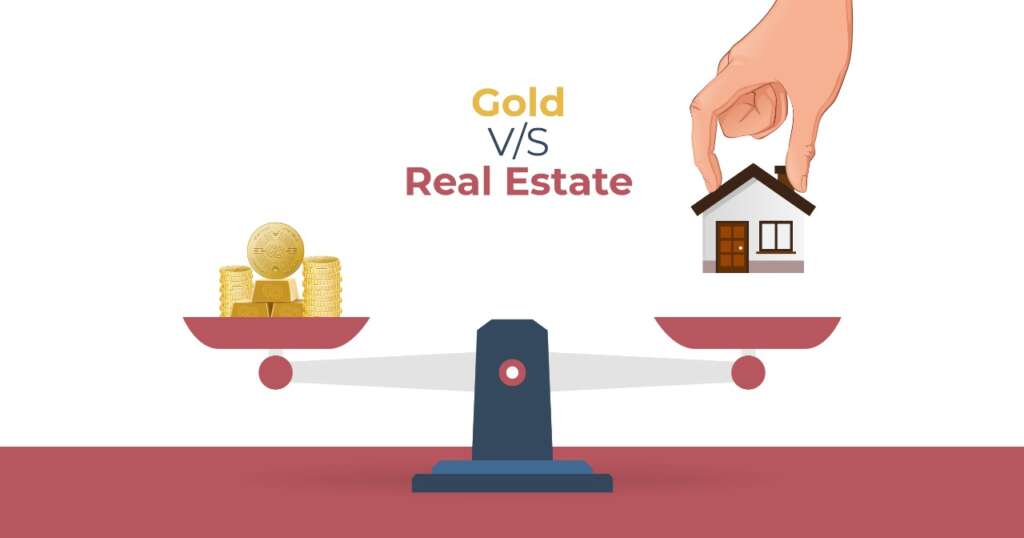Investing is a crucial aspect of financial planning, but choosing the right investment avenue can be daunting. Two popular options often considered are Investing in Gold vs. Real Estate. Both have their unique features, advantages, and disadvantages. In this blog, we’ll delve into the intricacies of investing in gold versus investing in real estate, evaluating their potential returns, risks, and the scenarios that could influence your investment decision.
Investing in Gold:
Between Investing in Gold vs. Real Estate, gold has been a symbol of wealth and a store of value for centuries. Investing in gold offers several advantages:

- Hedge Against Inflation: Gold has historically served as a hedge against inflation. When the purchasing power of fiat currencies erodes due to inflationary pressures, the value of gold tends to rise. This is because gold maintains its intrinsic value over time.
- Safe Haven Asset: During times of economic uncertainty or geopolitical instability, investors flock to gold as a safe haven asset. Its status as a tangible asset that is not tied to any specific country or currency makes it attractive during times of crisis.
- Portfolio Diversification: Gold’s low correlation with other asset classes such as stocks and bonds makes it an effective diversification tool. Adding gold to a diversified portfolio can help reduce overall portfolio risk. In times of market turmoil, gold prices often move inversely to equities, providing a cushion against losses.
However, there are also drawbacks to investing in gold:
- No Income Generation: Unlike real estate or dividend-paying stocks, gold does not generate any income. It relies solely on capital appreciation for returns. Therefore, investors looking for regular income may find gold less appealing.
- Lack of Utility: Gold does not produce any goods or services, nor does it have any intrinsic value beyond its industrial uses and aesthetic appeal. Its value is primarily based on investor sentiment and market demand, which can be unpredictable.
- Volatility: While gold is often perceived as a safe investment, it can experience significant price fluctuations in the short term. Rapid changes in supply and demand, as well as speculative trading, can lead to volatility. Investors should be prepared for short-term price swings when investing in gold. Moreover, you can thoroughly read about investing in gold here.
Investing in Real Estate:
In the war of Investing in Gold vs. Real Estate, Real estate has long been considered one of the most tangible and lucrative investment options. Here are some reasons why investors choose real estate:

- Potential for Appreciation: Real estate has historically shown steady appreciation in value over the long term. Well-chosen properties in high-demand locations can offer substantial returns on investment. Additionally, real estate values tend to keep pace with inflation, providing a hedge against rising prices.
- Rental Income: One of the primary advantages of real estate investment is the ability to generate rental income. Owning rental properties can provide a steady stream of cash flow, which can be particularly appealing for passive income seekers. Rental income can help offset the costs of property ownership, including mortgage payments, property taxes, and maintenance expenses.
- Leverage: Real estate investment allows for leveraging, meaning investors can use borrowed funds to finance a property purchase. This can amplify returns if the property appreciates in value, as the investor’s equity grows alongside the property’s value. However, leveraging also increases risk, as it magnifies losses in the event of a market downturn.
However, investing in real estate also comes with its own set of challenges:
- Illiquidity: Real estate investments are relatively illiquid compared to stocks or bonds. Selling a property can take time and may incur significant transaction costs, such as agent commissions and closing fees. This lack of liquidity can be problematic for investors who need to access their funds quickly.
- Maintenance and Management: Owning and managing properties requires time, effort, and additional expenses. From property maintenance to dealing with tenants, real estate investment demands active involvement or hiring professional management services. Investors should be prepared to handle the responsibilities associated with property ownership or factor in the cost of outsourcing these tasks.
- Market Risk: Real estate markets can be cyclical and sensitive to economic conditions. Economic downturns or local market factors can impact property values and rental demand, affecting investment returns. Additionally, changes in interest rates can influence the affordability of real estate purchases, potentially affecting property prices and rental yields. Read more about investing in real estate here.
Scenarios Affecting Investment Decisions:
The decision of investing in gold vs real estate may depend on various factors, including:

- Investment Goals: Consider whether you’re seeking capital appreciation, regular income, or a combination of both. Real estate may be more suitable for investors seeking income generation through rental properties, while gold may appeal to those looking for a hedge against inflation and market volatility.
- Risk Tolerance: Evaluate your risk tolerance and time horizon for investment. Real estate typically involves higher upfront costs and ongoing responsibilities, making it better suited for investors with a longer investment horizon and higher risk tolerance. Gold, on the other hand, may be more appropriate for conservative investors seeking to preserve capital and mitigate portfolio risk.
- Market Conditions: Assess current market conditions, economic outlook, and inflationary pressures to determine which asset class may offer better opportunities. In times of economic uncertainty or inflationary pressures, gold may outperform real estate as a safe haven asset. Conversely, during periods of economic growth and low inflation, real estate may offer better potential for appreciation and income generation.
- Diversification: Determine how each investment fits into your overall portfolio strategy and the level of diversification needed to mitigate risk. Both gold and real estate can play a valuable role in a diversified investment portfolio, providing exposure to different asset classes and investment opportunities. Consider your existing portfolio holdings and asset allocation targets when deciding how to allocate your investment capital.
Real Life Examples
Let’s delve into some real-world examples where investing in gold or real estate may be more advantageous based on specific scenarios:

Investing in Gold:
a. Periods of Economic Uncertainty:
During times of economic instability or geopolitical tensions, gold often performs well as a safe haven asset. For example, during the global financial crisis of 2008, investors flocked to gold as a store of value, driving its price to record highs. Similarly, during the COVID-19 pandemic in 2020, gold prices surged amid fears of a global economic downturn and currency devaluation.
b. High Inflation Environments:
Inflation erodes the value of fiat currencies, making hard assets like gold more attractive. In countries experiencing hyperinflation or currency devaluation, gold can preserve purchasing power. Venezuela is a prime example where hyperinflation led to the collapse of the national currency, bolivar, prompting citizens to invest in gold as a hedge against inflation.
c. Diversification During Stock Market Volatility:
During periods of heightened stock market volatility, gold can provide diversification benefits. For instance, in 2011, following the European debt crisis and concerns over the U.S. debt ceiling, gold prices reached all-time highs as investors sought refuge from equities.
Investing in Real Estate:
a. Rental Income in Stable Markets:
In markets with stable economic conditions and strong rental demand, real estate investment properties can generate steady rental income. For example, cities like New York, London, and Tokyo have consistently high demand for rental properties due to factors such as population growth, employment opportunities, and limited housing supply.
b. Long-Term Capital Appreciation:
Real estate investments in rapidly growing urban areas or emerging markets can yield significant long-term capital appreciation. For instance, investing in real estate in cities like Dubai or Singapore during periods of rapid economic growth and urban development has resulted in substantial property value appreciation over time.
c. Tax Benefits and Leveraging:
Real estate investors can benefit from tax advantages such as depreciation deductions, mortgage interest deductions, and capital gains tax deferral through 1031 exchanges (in the U.S.). Additionally, leveraging—using borrowed funds to finance real estate purchases—can amplify returns. For example, a real estate investor who purchases a property with a mortgage can achieve higher returns on invested capital if the property appreciates in value.
Hybrid Approach:
a. Diversification with Both Asset Classes:
Some investors opt for a hybrid approach by diversifying their portfolios with both gold and real estate. For instance, during periods of economic uncertainty, they may allocate a portion of their portfolio to gold as a hedge, while also investing in income-generating real estate assets for long-term wealth accumulation.
b. Balancing Risk and Return:
By diversifying across asset classes, investors can balance the risks and returns associated with each investment. For example, while gold may offer stability during market downturns, real estate investments can provide income and potential for appreciation during economic expansions.
Conclusion:
Both Investing in Gold vs. Real Estate can be viable investment options, each offering unique advantages and challenges. The decision to invest in one over the other depends on individual preferences, investment goals, risk tolerance, and market conditions. Some investors may choose to allocate their funds to both asset classes to diversify their portfolios and hedge against specific risks. Ultimately, conducting thorough research, seeking professional advice, and aligning investments with long-term financial objectives are essential steps in making informed investment decisions. Whether you choose to invest in gold, real estate, or a combination of both, careful consideration of the factors outlined in this blog can help you make the right choice for your financial future.


